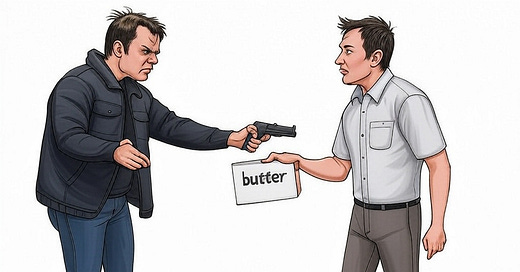Summary
Defence spending costs money. But not spending money on defence can cost even more money, if you're threatened by an aggressive neighbour.
Therefore the choice is not "guns versus butter", rather it is "guns versus no butter because the people with guns stole it".
(Does the one on the left look a bit like Elon Musk to you as well?)
Examples of guns-versus-butter thinking
Recently many people has suggested that it is wasteful to spend more money on defence. Some have used the guns versus butter analogy. Here are two examples:
(1) Michelle O’Neill, First Minister of Northern Ireland, recently said:
“..a time when public services are being cut…when we have endured 14 years of austerity…when winter fuel allowance is cut from old age pensioners…I would rather see money invested in public services than weapons of war.”
(2) In an article titled The Arms Industry is just going to make us poorer, Kevin Crane wrote:
[Starmer will] commit absolutely to the massive increases in what is euphemistically called ‘defence spending’: that is to say, diverting even more public money away from keeping ordinary people healthy, sheltered, educated and nourished and giving it to arms companies instead. This is obviously the new consensus across Europe, being backed by governments and political parties on both the right and left.
Threats from Putin and Trump
Right now, Putin is invading a European country, Ukraine, partly in order to seize its mineral wealth.
And Trump is also making threats:
against Ukraine which he expects to just hand over their minerals in return for nothing
against Canada, which he wants to annex and turn into the USA's 51st state,
against Greenland (which is part of Denmark) which he also wants to annex.
against Panama; Trump has said he will take the Panama Canal by force
So what form might coercion against the UK take? One possibility is that Trump might ask/coerce the UK to sign a trade deal that opens up the NHS to being plundered by the US healthcare industry. This is something he suggested in 2019:
Donald Trump has declared he wants the NHS to be on the table in any US-UK trade deal
And more recently in 2025:
Donald Trump has put the possibility of a long-awaited UK-US trade deal back on the table [...] Health Secretary Wes Streeting said [...] patients could be offered up for medical research.
(As an aside, am I the only one who read “offered up for medical research” and imagined it as “ritually sacrificed to appease angry gods”?)
The USA is also likely to make other proposals on trade that are very much slanted towards US interests and against UK interests. They’ve always done this to some extent, because US foreign and trade policy is controlled by commercial interests, but under Trump are likely to do it a lot more.
Furthermore, if Putin succeeds it controlling large parts of eastern Europe, him and Trump together may well control the supply of certain raw materials, which could also be used as leverage to coerce Britain and other European countries into signing unfavourable trade treaties.
European defence is British defence and vice versa
This last example suggests that the UK shouldn't think purely of itself in terms of defence but as the whole of Europe acting as a whole unit with collective defence. This includes the EU countries and the UK, and also Norway, Iceland and Turkey.
As well as Europe, we should also allow other interested countries to join our defensive alliance. I've already mentioned Canada and Panama, both of which speak European languages and are therefore culturally European. Other countries that might be interested include Australia (which UK is collaborating with to build submarines) and Japan (which UK is collaborating with to build next-generation fighter aircraft).
In general, the bigger and stronger a defensive alliance, the less likely it is that coercion will be used against it.
Conclusion
In a dangerous worldwide security environment, it may well make sense and save money in the long term for a country to spend more on defence, because if it doesn't it may end up paying a lot more if a rival decides to take its wealth by force or economic coercion.
I believe this is true of the UK right now; therefore the UK should spend more on defence. It should also seek allies, most of which will be in Europe.
Prime Minister Keir Starmer is planning to raise defence spending from the current 2.3% of GDP to 3.0% of GDP. That extra 0.7% is a lot less than we'll end up paying if Putin and Trump have their way with us. (And in any case 3% isn’t very much, historically speaking — it was 5% as late as 1983, and in the 1960s exceeded 6%).
As well as increasing defence spending, Starmer should look to co-operating with other European countries closely, by rejoining the EU (which would save money by boosting the economy) and by forming/joining a European Military Alliance.





Olive oil is better than butter anyway, it is cruelty-free and better for your health.